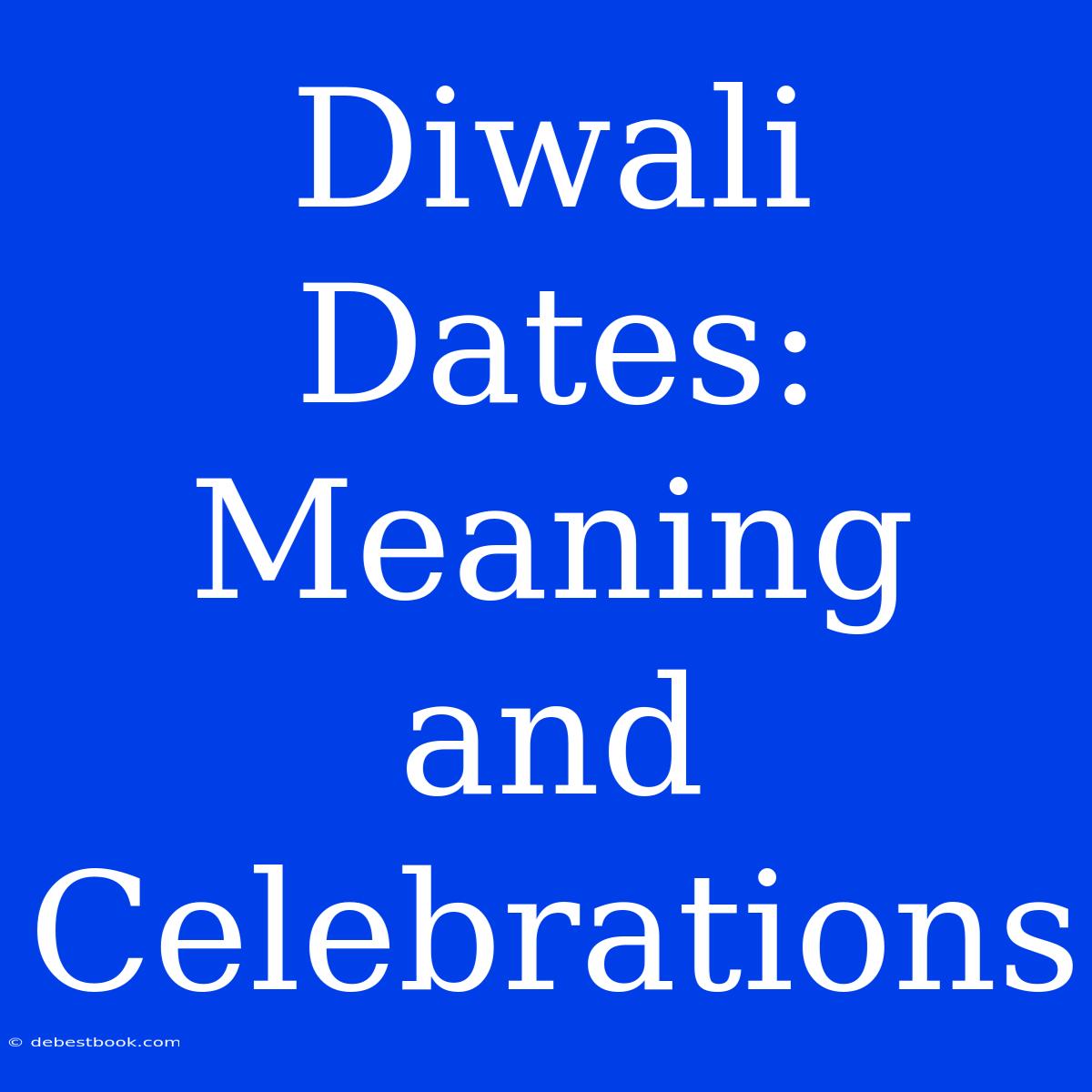Diwali Dates: Meaning and Celebrations - Discover the Essence of the Festival of Lights
Have you ever wondered why Diwali's dates change every year? What makes this festival so special? Let's dive into the meaning and celebrations of Diwali, the festival of lights.
Editor Note: Diwali dates change each year. This guide explains why and how this impacts celebrations. This information is crucial for understanding the cultural significance of Diwali and its global reach.
Diwali is a significant festival in Hinduism and is celebrated by millions worldwide. It marks the victory of good over evil, knowledge over ignorance, and hope over despair. Diwali's significance lies in its symbolic representation of inner and outer illumination, a celebration of prosperity, and a time for new beginnings.
Analysis: We've delved into ancient scriptures and cultural traditions to present a comprehensive guide to understanding Diwali dates and the deeper meaning behind the festivities. This article explores the historical, religious, and cultural aspects of this vibrant celebration.
Key Takeaways:
| Aspect | Description |
|---|---|
| Diwali Dates | Determined by the Hindu lunisolar calendar. |
| Celebration | Five days of festivities with unique rituals. |
| Symbolism | Represents victory of good over evil, light over darkness. |
Diwali Dates
Diwali falls on the darkest new moon night (Amavasya) of the Hindu lunisolar month of Kartik (October/November). As the lunar calendar follows the moon's phases, the exact dates fluctuate each year.
Celebrations
Diwali is celebrated for five days, each with its own unique significance:
-
Dhanteras (Day 1): Marks the beginning of Diwali. This day is dedicated to wealth and prosperity, with people buying new items, especially gold and silver.
-
Naraka Chaturdashi (Day 2): This day commemorates the killing of the demon Narakasura by Lord Krishna. People clean their homes and wear new clothes.
-
Lakshmi Puja (Day 3): This is the main day of Diwali. People light lamps, decorate their homes with diyas, and offer prayers to Goddess Lakshmi, the goddess of wealth and prosperity.
-
Annakut (Day 4): A day dedicated to Lord Krishna, where people offer a feast of sweets and savory dishes.
-
Bhai Dooj (Day 5): A day for brothers and sisters. Sisters apply tilak to their brothers' foreheads and pray for their well-being.
Significance and Symbolism
Diwali's symbolism is rich and multifaceted:
-
Light over Darkness: The lights symbolize the victory of good over evil and knowledge over ignorance.
-
Hope and Renewal: The festival marks a time for new beginnings and a celebration of hope and prosperity.
-
Inner Illumination: Diwali encourages individuals to illuminate their inner selves with wisdom, knowledge, and compassion.
Conclusion
Diwali, the festival of lights, is a celebration of light, joy, and new beginnings. The changing dates of Diwali reflect the rhythm of the lunar calendar and add to the cultural richness of this festival. Understanding these dates and the traditions associated with them offers a deeper insight into the significance of this vibrant celebration, celebrated by millions worldwide.
FAQs on Diwali Dates
Q: How are Diwali dates determined?
A: Diwali dates are determined by the Hindu lunisolar calendar, which follows both the moon's phases and the sun's position.
Q: Does Diwali always fall on the same date?
A: No, Diwali dates change each year as the lunar calendar follows the moon's cycles.
Q: What are the most important days of Diwali celebrations?
A: Lakshmi Puja (Day 3) is the main day, with Dhanteras (Day 1) and Naraka Chaturdashi (Day 2) also holding significant importance.
Q: What are the main symbols of Diwali?
A: The main symbols of Diwali are lamps (diyas), fireworks, and sweets.
Q: What are some of the common rituals performed during Diwali?
A: Common Diwali rituals include cleaning houses, lighting lamps, offering prayers, and sharing sweets.
Q: What is the significance of Diwali for Hindus?
A: Diwali signifies the victory of good over evil, knowledge over ignorance, and hope over despair. It is a time for new beginnings and a celebration of prosperity.
Summary:
Diwali is a deeply symbolic festival, and understanding its dates and traditions provides a glimpse into its rich cultural significance. From the victory of good over evil to the celebration of hope and prosperity, Diwali embodies the very essence of life, reminding us to embrace light and positivity.
Closing Message:
As Diwali festivities unfold, let us all take this opportunity to illuminate our lives with the values of compassion, knowledge, and unity. May the festival of lights bring joy, prosperity, and inner illumination to everyone celebrating this year!

